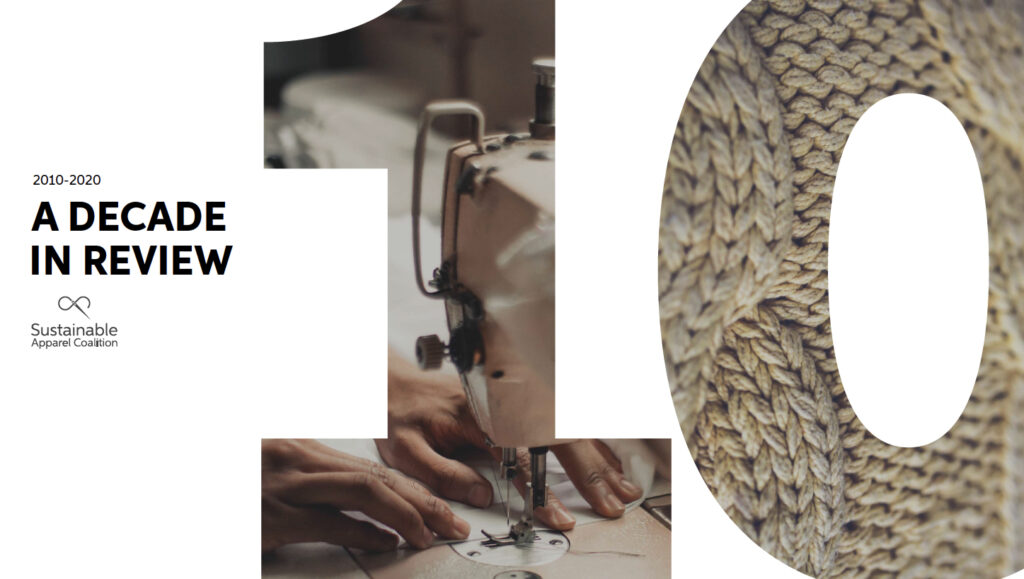
Dear Fashion: Let’s Step Up and Get Aligned
In a recent opinion editorial with WWD, CEO Colin Browne argues fashion needs to take more serious and coordinated action on sustainability. Read the highlights here!
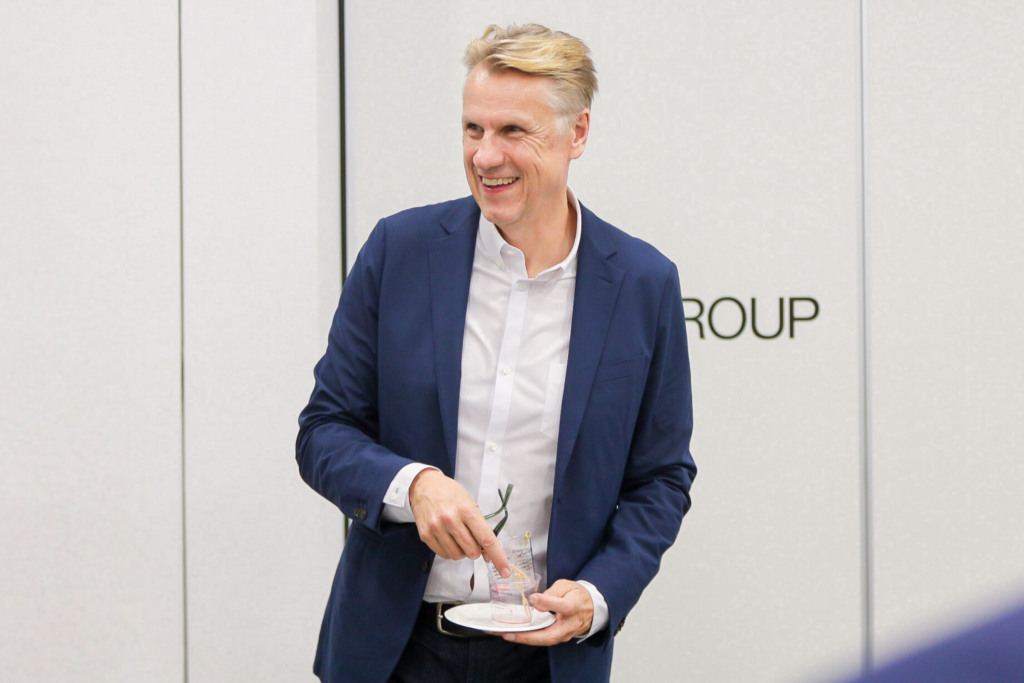
At the end of June, Cascale published its 2023 Annual Report, showcasing many milestones, achievements, and a renewed strategic direction over the past year.
Here, Cascale team members reflect on their highlights from the year, capturing their shared commitment to sustainability and collective action at scale.
“In 2023, we refined our strategic plan and this past year has been the implementation of that plan, which focuses on combating climate change, fostering decent work for all, and building a nature-positive future. This is our true north. We also took our collaborative efforts to new heights, signing strategic partnerships with the Apparel Impact Institute and Fair Wear and continuing our work with The Industry We Want among many others. The opportunity at hand is to dissolve barriers, speak with our fellow stakeholders across the value chain, take calculated risks, and furthermore – take responsibility and hold each other accountable.”
Executive Pick: Colin Browne, Chief Executive Officer
“With improved data accuracy, stakeholder input, and global standards in mind, we pulled off a series of improvements to the Higg Index last year, including the Higg Brand & Retail Module (BRM) and Higg Facility Environmental Module (FEM). All of these enhancements enable a clear pathway forward with actionable intelligence. We look to our community for guidance as we continue to evolve our tool roadmap to drive change.”
Executive Pick: Jeremy Lardeau, Senior Vice President, the Higg Index
“Cascale events offer a vital platform for our diverse and global community to come together in person and online, fostering open dialogue, exchange of best practices, and collaborative solutions. In 2023, the Annual Meeting saw record attendance with our community coming together in Boston under the “Evolution for Impact’’ theme. We also relaunched our Manufacturer Forum series last year, giving a space for manufacturers to address challenges while providing innovative solutions.”
Executive Pick: Lee Green, Senior Director, Communications
“The development of a shared perspective of the apparel supply chain tiers will provide clarity to our industry and enhance future communications and tool alignment strategies. We look forward to the continuation and release of this work with our apparel alliance partners [Apparel Impact Institute (Aii), Zero Discharge of Hazardous Chemicals (ZDHC), and Textile Exchange].”
Executive Pick: Joël Mertens, Director, Higg Product Tools
“We hit an incredible membership milestone in 2023. Cascale’s membership, for the first time, surpassed 300 global members, including retailers, brands, manufacturers, governments, and NGOs. Membership also began to expand beyond textiles and apparel, and into adjacent product categories. Today, Cascale’s membership is growing with representation across apparel, footwear, textiles, home furnishings, outdoor sporting goods, bags and luggage companies.”
Executive Pick: Erlinda Lee, Director, Global Membership Development
“With the formation of our Public Affairs department last year, we answered the call to not only meet regulation in stride but anticipate its ripple effect on our industries. With unanimous support from the Board, we assembled our Public Affairs department with technically rich expertise and leadership to guide us into our next era of impact.”
Executive Pick: Andrew Martin, Executive Vice President
“In 2023, we saw significant progress in the Decarbonization Program, with over 50 percent of members committed to, or in the process of committing to, Science-Based Targets. Cascale also announced the launch of its Manufacturer Climate Action Program (MCAP) which enabled many suppliers to advance their decarbonization journey by having the access to the support and knowledge in science-aligned target setting.”
Executive Pick: Joyce Tsoi, Senior Director, Decarbonization Program
With much in store in upcoming months, including the 2024 Annual Meeting, the Cascale team is pleased to continue its foray into a new era of impact alongside stakeholders.
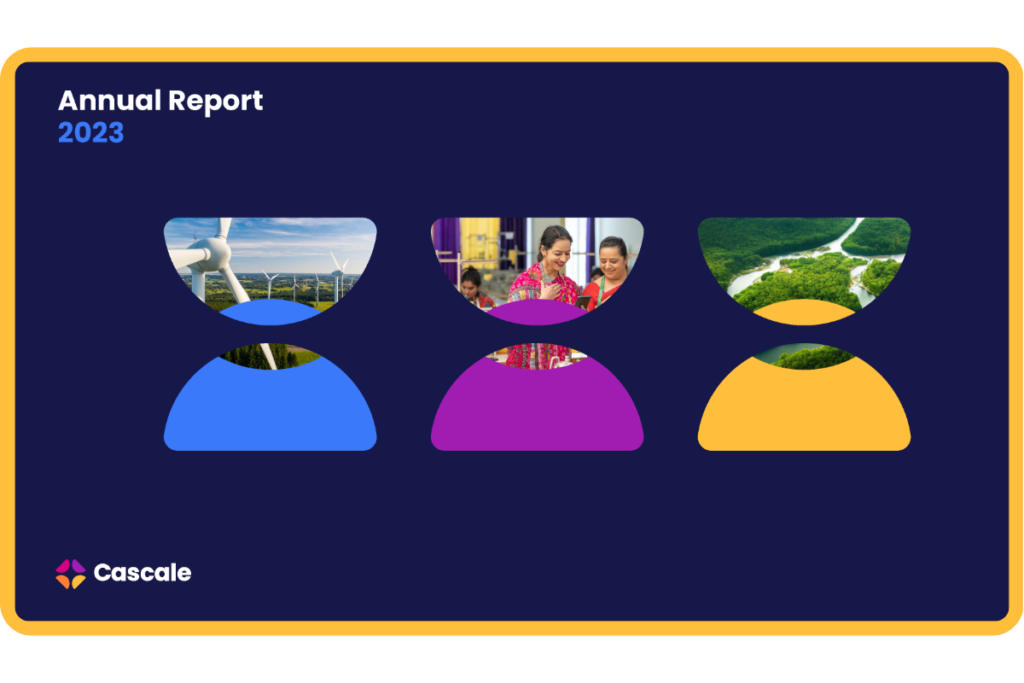
Cascale has released its 2023 Annual Report, showcasing the milestones, achievements, and strategic direction of Cascale over the past year, reflecting its commitment to sustainability and collective action at scale.
“2023 has been a year of significant transformation for Cascale. We have not only grown our membership and enhanced our tools but have also laid a strong foundation for future impact. Our commitment to driving sustainability and equitable business practices is stronger than ever. I am excited about the journey ahead and look forward to collaborating with our members and the broader ecosystem to achieve our collective goals,” said Colin Browne, CEO of Cascale.
This was a transformative year for Cascale, marked by significant growth, strategic initiatives, and impactful collaborations. The annual report provides an in-depth look at the organization’s efforts to enhance transparency, combat climate change, foster decent work, and build a nature-positive future. It also introduces the exciting rebranding of the organization and highlights the progress made with its flagship Higg Index tools. It is the second publication of its kind for Casale, with 2022 being the inaugural reporting year.
Key Highlights from the 2023 Annual Report:
“What an eventful year! The progress we’ve made in 2023 is a testament to the dedication and hard work of our staff, Board, members, and stakeholders. While challenges remain, our path is filled with purpose, and we are more committed than ever to driving sustainable change across the industry,” said Tamar Hoek, Board Chair of Cascale, and Senior Policy Director Sustainable Fashion, Solidaridad.
Looking Ahead
As Cascale moves forward, it remains dedicated to catalyzing collective action toward an equitable and restorative consumer goods industry. The efforts in 2023 have laid a solid foundation for continued progress, and Cascale looks forward to working closely with its members and stakeholders to achieve even greater impact in the years to come. The future will also be a hot topic at Cascale’s Annual Meeting, to be held September 9 to 11 in Munich, Germany.
Cascale invites all stakeholders to explore the full 2023 Annual Report and join in the shared journey toward a more sustainable future. Members can register for the upcoming Annual Meeting here.
Cascale has released its 2023 Annual Report, showcasing the milestones, achievements, and strategic direction of Cascale over the past year, reflecting its commitment to sustainability and collective action at scale.
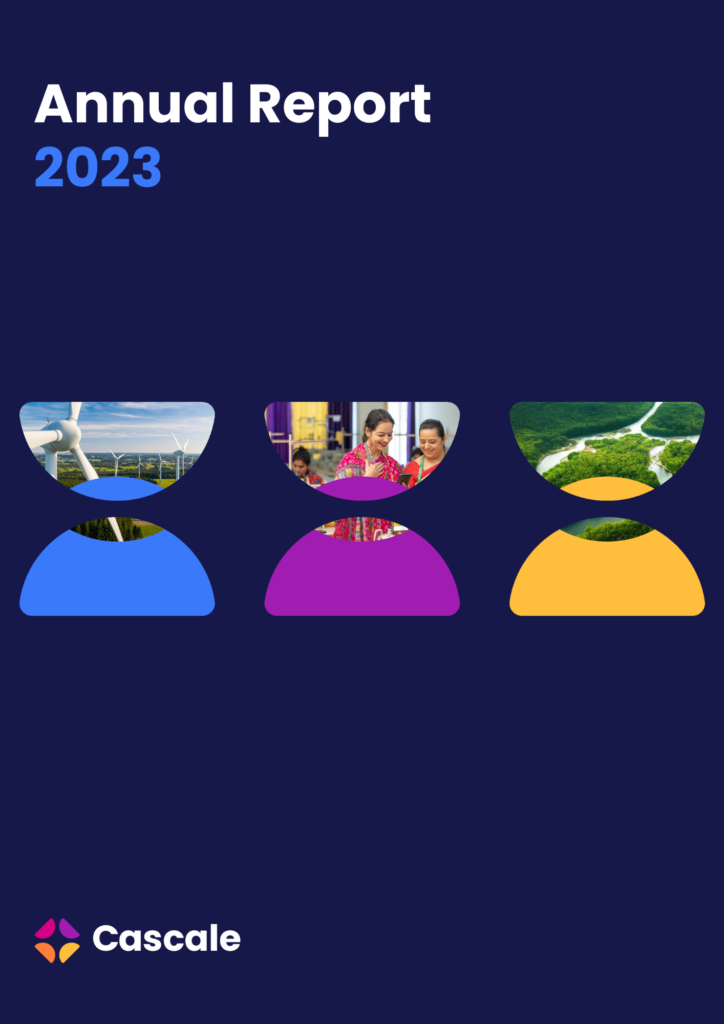


Following the recent publication of our Annual Report for 2022, I’ve been reflecting on the strides we’ve made to move our industry forward and what the next steps are to reach our industry’s shared goals.
I am continually impressed by the unwavering commitment and support of our members, partners, and stakeholders. Looking back on our journey over the last year, we’ve encountered hurdles and experienced growth and progress. Amidst complex challenges, our collective dedication to collaboration and shared vision has propelled us forward, driving necessary change across global supply chains toward a more responsible, equitable, and just industry.
As I write, it’s barely six weeks since climate scientists warned it’s more likely than not that our planet’s temperature will soon pass the critical threshold of 1.5°C and last week saw the hottest days ever recorded on Earth in over 100,000 years. The very real impacts of this continued warming amplifies the significance of our work in transforming business for exponential impact and driving sustainable improvements across global supply chains.
Time is running out. We can and must achieve change, faster.
Our Coalition is a force for powerful change. The progress we achieve together, but also our learnings from the challenges we face, contribute to industry advancement and have the potential to impact the well-being of millions of workers, communities, consumers, and the planet we are part of.
The SAC was formed with an ambitious vision: to align the industry through common sustainability measurement. We’re proud of our collaboration, continuous evolution, and widespread adoption of the Higg Index suite of tools. Serving as the leading environmental and social assessment in the apparel and footwear industry, it measures the entirety of the value chain at scale and is used by over 21,000 organizations worldwide.
Today, we’re driven by an even more ambitious vision of a global consumer goods industry that gives more than it takes – to the planet and its people.
Powerful collaborations for change need to happen now.
The time for decarbonization pilots and small projects is over. Companies are not going to achieve their science-based targets without collaborating with their supply chain partners on co-creating the solutions and incentives toward those targets together.
Through our Collective Action Programs, we’re witnessing the power of collaboration, working together across value chains to create innovative solutions to address pressing industry challenges. For example, in 2022, our Decarbonization Program began supporting members in their efforts to reduce greenhouse gas emissions in line with the 1.5°C goal.
Through guided steps and strategic partnerships, the program is fostering cooperation and alignment. I am excited about its potential to help companies transition to renewable energy, implement energy efficiency, and eliminate coal usage across the supply chain.
Finance will also play a critical role in supporting this transition. Connecting the dots between where funding is needed and where that capital is coming from is increasingly important. I do think we’ve seen progress this year in driving more financing toward the necessary changes and interventions. Innovative models like Apparel Impact Institute (Aii)’s Fashion Climate Fund are paving the way for such advancements, and I’m delighted that the SAC recently announced a new strategic partnership with Aii to help unlock finance to support our collective goals.
The impact of our work can be even greater with the help of public policy.
The systemic changes needed will only happen when every part of the system is engaged, and policy is an incredible lever for this. But while we recognize the role of regulations as catalysts for progress, we’re also calling for the clear and consistent guidance our industry needs to speed up change, not slow it down.
For years now, the SAC has been actively involved in advocating for harmonized regulation and consistent approaches, such as the PEF legislation. Now more than ever, we are focused on strengthening collaborative relationships and working together to create scalable programs and policies that drive meaningful change and reduce the impacts of the sector as a whole.
Regulations will be a missed opportunity if they’re not harmonized. We’re already seeing a patchwork approach appearing in the EU, creating confusion and stalled progress for the industry.
Successful policy should create clarity and consistency on what companies need to do. If it doesn’t, it risks paralyzing the industry with inaction and focusing attention and resources on complying across different territories instead of genuine progress on the ground.
Transparency is another vital part of the picture – it’s fundamental to building trust and driving responsible practices.
At the SAC, increasing transparency in sustainability performance across the industry has always been a key focus. Given the rising concerns of greenwashing, the insights gained from our Transparency Program’s consumer-facing labeling pilot in 2022 are important not only for us but for the entire industry. It sparked a crucial, industry-wide conversation on how we can overcome the information challenge of synthesizing the industry’s complexity in a truly comprehensive and representative way.
We are witnessing a notable shift toward greater accountability, traceability, and disclosure throughout the value chain that will collectively shape a more sustainable and equitable industry.
Today, our team is fully committed to building disclosure pathways that align with the latest regulatory requirements and that use accountability mechanisms, such as impact dashboards of the industry’s sustainability performance as measured by the Higg Index, to accelerate the pace against our impact goals.
By aligning on what and how the apparel and footwear sector communicates social and environmental information, we can empower consumers and contribute to a future where supply chain transparency becomes the norm rather than the exception. This work will involve robust systems for tracking, documenting, and measuring production, and collaboration across the industry will be essential towards achieving shared objectives.
We also know transformative change goes beyond environmental action.
True sustainability encompasses both environmental and social progress. The SAC firmly believes this and actively supports our members and their supply chains in implementing employment practices that uphold labor rights, fair wages, and safe working environments.
For example, in 2022 we made significant updates to the Higg Brand and Retail Module (BRM), including deepening the responsible purchasing practices section to align with industry best-practice. This will support our brand and retail members to engage more responsibly and transparently with their supply chains.
In collaboration with members and partners, we will continue striving for social equity and a just transition to a future that leaves no one behind and nurtures shared prosperity.
The time is now to align on the best path forward.
As a global convener of the industry, the SAC’s role is to establish common ground with all parties. It was great to be able to bring together our global community for the first time in three years at our Annual Meeting in Singapore. It was a chance to engage on issues with the entire value chain – including with suppliers who often bear the brunt of decarbonization and the impacts of climate change – and on how to overcome challenges by working together. Co-creating solutions with all voices, especially the Global South, is essential for the future we want.
We will continue convening our members and the broader industry, and we’ve revised our Strategic Plan to inform the journey ahead. This update will reflect the global changes since the launch of the plan in 2020 and improve how we support members and partners toward an equitable and restorative future.
Deep collaboration is crucial; it is the very heartbeat of our journey.
It’s imperative we all work together, driven by a shared intent for mutual benefit and a commitment to our collective goals.
This is a critical moment in time. With less than seven years until 2030, the actions we advocate for and the decisions we make hold the power to shape our industry and reverberate throughout the world. There are no simple answers, but we stand united, equipped with the collective reach, creativity, innovation, knowledge, and collaborative spirit to serve as leaders, setting an example for other sectors to follow.
Looking ahead to the future, I am excited by the opportunities for transformative collaboration within our community. Together, we will shape an industry that not only seeks equity but restores harmony with our planet. The world needs an industry that gives back—to the planet and its people.
Let us celebrate our achievements and draw insights from our experiences. Together, we will forge a path toward a better tomorrow for all.
Our reflections on driving positive progress, addressing challenges and fostering collective impact within the textile and apparel industry.
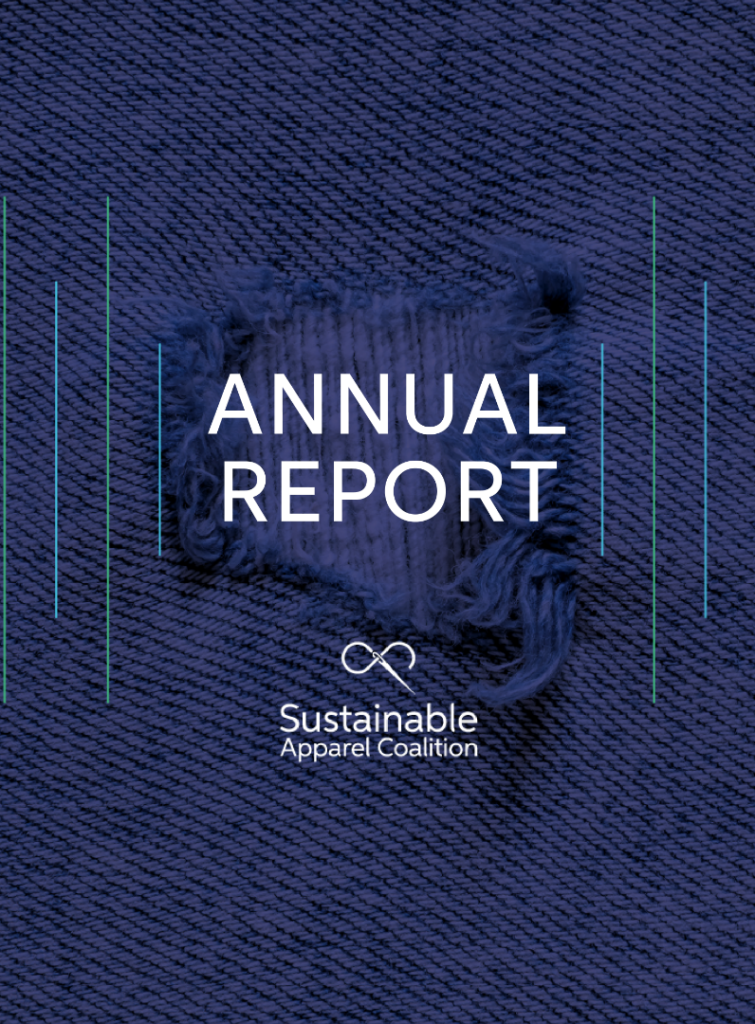
A decade after we launched, we find ourselves at an inflection point. The COVID-19 pandemic, changes to our climate, and social unrest have fundamentally altered our industry, our society, and our way of life. It is no longer an option to delay action. Worldwide, consumers and investors are prioritizing companies that prioritize sustainability.
